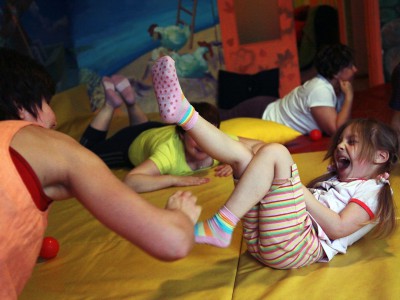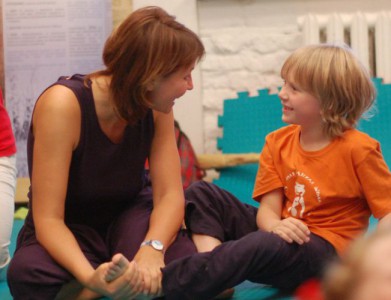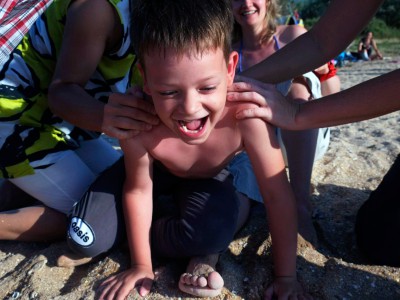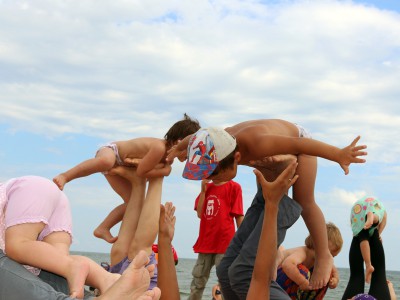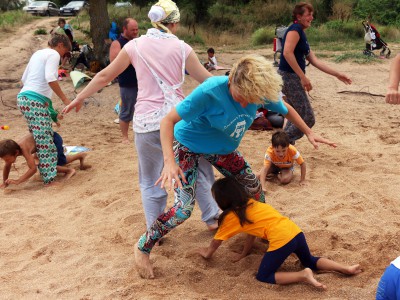The effects of Family Soft School on different kids:
As you may have noticed, Family Soft School is not a usual physical training method. We place the utmost importance on developing abilities and skills that benefit our participants' nervous system. This involves creating a healthy mentality for the children in our program and a healthy psychophysical mindset for their parents. The unity of the soul and body is very important to us. In the next few paragraphs we will discuss how different children benefit from FSS.
Healthy or neurotypical kids:
The children in our program become more confident, gain more control over their bodies, and improve their safety. For example, when they are playing in the playground they know how to align their bodies to avoid trauma in dangerous situations. The parents' and children’s fears are defeated one step at a time. FSS helps kids be healthy and physically and emotionally well balanced.
FSS helps children with different developmental specifics.
When a child with neurological specifics starts attending our school, we make sure to accommodate for their needs and work to overcome their neurological difficulties.
The most popular advise that parents get is to postpone schooling for another year, start their child on prescription drugs, or start taking swimming lessons.
FSS goes against this and provides a different, essential, and irreplaceable solution.
More specifically, we are very successful at helping children who have suffered from hypoxia during their prenatal period. In Russia, these children are under close neurological supervision for the first year of their lives. This is due to the prevality of hypoxi-ischemic injuries such as CNS, a syndrome that causes muscular dystonia, hemisyndrome, and the stopping of motion skills formations. Usually, this neurological rehabilitation is completed after one year and the child is deemed healthy. This is a very important moment because while the parents are relaxing from their past stress, they are missing valuable recovery time with their children. Today the share of such «Healthy» children is at least 70%. Our technique is beneficial to all children because it includes everything a child needs for normal development. For example, it includes a variety of different kinds of motion, promotes contact within the family, builds healthy relationships, includes a lot love and physical contact, produces sensorial experience and joy from finding different solutions, and keeps up the child’s motivation to constantly develop and learn.
For kids with phobias:
There are multiple reasons why a child would have a phobia. For example, a stressful childbirth can lead to an unnatural attitude towards medical staff. Another reason is that the anesthetics used during childbirth can decrease the amount of endorphins a mother generates. The mother’s endorphins are important because they remove the birth pain and shock for the child. Other reasons are: isolation, even if it is brief, from the mother and the mother’s high levels of fear sensitivity. Furthermore, birth trauma often causes minor brain circulatory disorders in the areas that are responsible for emotions, which can form the basis of fears. Moreover, it may affect the formation of a child’s emotional sphere, their will sphere, their sleep patterns, and their speech and intellectual development. The result of this is that some kids are very scared and anxious. They frequently cry, suffer depressive spells, and experience separation anxiety from their mothers.
The situational approach used in FSS provides difficult, yet necessary, emotional-physical simulations that help children overcome their fears. The level of sophistication and time slot allocated for each task is defined by the instructor on a case by case analysis. This means that every child gets individual attention. This way, the child can grow and learn in a safe environment. They will learn to respond to our tasks in adequate and positive manners; eventually they will master them. Their relatives, such as their mother, father, uncle, aunt, and grandparents, are also taught how to leave their fears behind and trust their children. This will create a positive feedback loop in which their children will become more confident in the presence of their relatives.
For children with psychological problems:
Some children have problems with authority issues or with their peers. They might start problems and pick fights with their parents, other children, their educators, and their other family members. These children have psychopathic or unhealthy traits, such as unreasonable aggressiveness, problems with their confidence, hysteria, pathological falsehood, increased fussiness, and very negative outlooks on life.
In this case a child learns to be self-confident, not at the expense of their loved ones, but because of them. The child is disciplined in a positive, supportive way that produces successful mindset shifts. Their aggression is reduced and their relationships with their parents and peers are normalized. However, in order to gain these sustainable results, the family must be trained for at least a year, as human nature is inert. Changes do not take place immediately, as there is usually some sort of psychological resistance. Fear prevents people from parting with established stereotypes and neurological patterns. However, a positive relationship model can fix this! All it takes is an instructor who works with the whole family and practices FSS.
For children with serious pathologies
We have found that our program garners the most success when we include one child with special needs and developmental specifics.
Children with severe neurological pathologies might have cerebral palsy, different injuries, severe speech disorders, and significant disturbances in their emotional and emotional spheres. Luckily, Ella Glushkova has considerable knowledge on and experience working with these neurological pathologies. She has been working with disabled children since 1993, which coincidentally is also when FSS opened. She has worked in the Rehabilitation and Integration Camps in Taganrog (1993), Evpatoria (1994), Dubna (1996), Poland (2004−2005), in the Moscow Region (Integration), in a boarding school for children with severe speech disorders, with Autistic kids on the Kashkin meadow, and in therapeutic groups for stuttering adults and children. Different studies have shown that her methods are effective
We believe that FSS works best when in every group of neurotypical, healthy children there is one child with developmental specifics. In addition to obtaining a general psycho-physical correction, the child with developmental specifics socializes and reaches out to other children. Furthermore, the neurotypical families interact with their non-neurotypical counterparts. This allows them to understand that God has created people to be different, but equal. They learn to help and care about these children, which promotes our message of Love.
- © 1993—2024. Write to Ella
Design: Igor Filimonov

